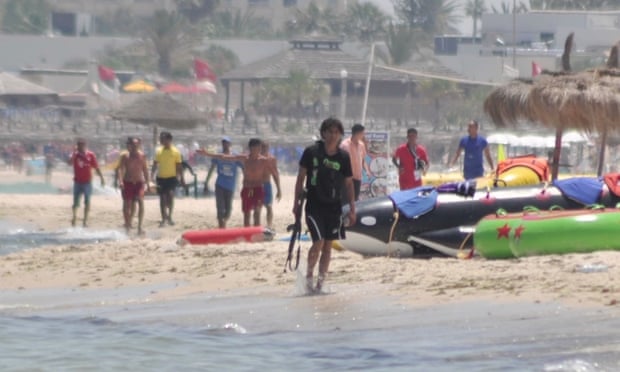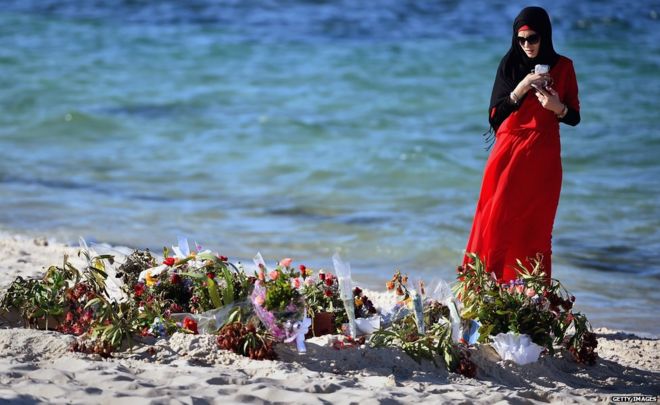Survivor co-operation:
The attack began when the gunman started shooting on the beach, and there was understandable fear and rapid flight as the full horror of what was going on dawned on those present. However, even in this horrific situation holidaymakers were showing concern for others, and this is clearly illustrated by the following quote from British tourist Tony Callaghan;
I said to my wife "Run back to the hotel. Take cover." But I couldn't go with her at that point because there were too many people who were just lazing on the loungers, just looking up, without any sense of urgency. I started shouting at the top of my voice for people to run. I was waving my arms around and I must have stayed there another minute or more.
This quote is also interesting because it shows that he stays behind and places himself at further risk to alert others of the danger (most of whom were presumably not close friends or family and possibly even complete strangers). Tony's wife, Christine then describes how other tourists comforted her as she left her husband to escape the beach;
I was walking as fast as I could. My heart was beating so fast I was trembling. As I started to cry, a lady came towards me with her husband, asked if I was on my own, put her arms round me and gave me a hug.
Later on, as people fled the beach towards what they thought would be the safety of the hotel, the gunman pursued them and began attacking people inside, meaning that they had to quickly find cover in which to hide. A British holidaymaker there with her two teenage sons describes the situation as 'sheer panic', but if you explore her account in more detail, interesting nuances in her account emerge that I think show the general co-operation that was going on. Sam (the mother) and Tom (her son) describe what happened when they fled into the toilets and were separated from her other son Callum;
Sam: We heard this other girl who followed us in there and she was crying in the toilet next door. I was saying: "Please be quiet." We didn't know if he was still in the corridor or if there were more of them. So we brought her into the toilet and she passed out. We had to sit her on the toilet and bring her round.
Tom: She had a massive piece of shrapnel in her leg. I said to her: "I'm going to have to take this out if I'm going to stop the bleeding." So she said OK, and I pulled it out and packed her leg with tissue paper, and used my top to tie it round to try and stop the bleeding. Then I did the same with my mum's leg.
Sam: I felt so sick. I thought: "This is it. We're not going to survive this." I didn't even know if my youngest son was OK. We were in sheer panic. Luckily we had our mobiles with us. The lady of the family that had Callum - they'd taken him and barricaded themselves in - rang me and said: "We've got Callum."
Tom: She had a massive piece of shrapnel in her leg. I said to her: "I'm going to have to take this out if I'm going to stop the bleeding." So she said OK, and I pulled it out and packed her leg with tissue paper, and used my top to tie it round to try and stop the bleeding. Then I did the same with my mum's leg.
Sam: I felt so sick. I thought: "This is it. We're not going to survive this." I didn't even know if my youngest son was OK. We were in sheer panic. Luckily we had our mobiles with us. The lady of the family that had Callum - they'd taken him and barricaded themselves in - rang me and said: "We've got Callum."
So, I think these accounts show quite well how even in life-threatening emergencies, people will help and comfort those around them, even if they are separated from their loved ones and/or amongst strangers. This supports the research I did with John Drury into mass emergencies, such as the July 7th 2005 London bombings (Drury et al, 2009 a&b), where we argued that a form of collective resilience emerged amongst survivors that encouraged co-operative behaviour (as opposed to selfish and/or 'panicked' behaviour) while they waited for outside help from the emergency services. It's not that everyone necessarily becomes super-heroes in these situations, it's more that general co-operative norms emerge that mean that simple acts of co-operation (or just comforting others in distress) become more possible precisely because people tend to remain calm (despite the understandable fear they may be experiencing), and that such co-operation would be much more difficult if there was mass 'panic' instead.

Tourists comfort each other in the aftermath of the Sousse attack
Locals as 'zero-responders':
It was not just tourists that co-operated with each other, and there were also numerous reports of local Tunisians shielding tourists from danger, helping victims, and even confronting the gunman to try and stop his murderous rampage. For instance, two locals working on the beach initially tried to reason with the gunman;
We said: "Please stop shooting." He didn't listen to us. He just kept shooting. He didn't care.
They then helped evacuate some tourists from the beach in their boat (other tourists were also helped to hide in nearby shops by the owners) and then joined a growing group of locals who began to confront the gunman when it became apparent that he was initially only targeting tourists (although he later began shooting at locals and the police shortly before being killed in the final fire-fight). This willingness to confront the gunman manifested itself in two stages: first they formed a human chain along the beach to prevent him getting close to other tourists (as captured in the photo below), and then began actively pursuing him. This exchange, shows how two locals confronted one of the first policemen on the scene who was initially reluctant to engage the gunman (Rezgui);
Mehdi:
When I saw the tourist policeman, I said to him: "Why aren't you shooting the terrorist?" He said to me: "I don't have a bulletproof vest."
Mohamed:
Mohamed:
I told him: "I've got no vest, but I'm going." He said: "It's your risk if you die." I said: "OK, no problem." The police were scared. One said: "If he sees me with a police T-shirt, he will shoot me." So he rolled up the T-shirt in his hand and he ran with the people. A young Tunisian man in red shorts seized a gun from an unwilling policeman and headed off to try to fire it at Rezgui. He missed him and the gun jammed after two shots.
In a previous post about the 2013 Westgate Mall attack in Kenya, I looked at the concept of 'zero-responders' which has been developed in recognition of evidence (eg Cole et al, 2011) that uninjured survivors and bystanders at major incidents are often able to spontaneously co-operate to provide first aid and evacuate survivors before outside help from first responders arrives. What is also particularly significant here, is that in this situation a 'zero-responder' seems more willing to take action than the policeman himself, which aptly illustrates the potential for 'zero-responders' to spontaneously take the initiative, especially in the face of hesitation from more official emergency responders

Tunisians form a human chain and pursue the gunman along the beach
Conclusion:
I have felt a connection with Sousse and the people of Tunisia in general ever since I was there during the 2011 Jasmine revolution and it was my experiences there that inspired me to start writing a blog in the first place. Most notably, I was struck by their hospitality and caring attitude towards tourists. For instance, we witnessed a few protests while we were there and even got caught up in a riot where we had to scatter down back streets with locals, as there was a real fear that the police were going to open fire on the crowd. However, at no point did we feel threatened by the people there and other crowd members were talking to us and looking out for us as we fled. I find it desperately sad that such an atrocity could happen in Sousse, and feel not only for the victims and their families, but also the local Tunisians whose livelihoods depend on tourism and are presumably already suffering a collapse in the numbers of tourists visiting Tunisia. However, I hope that this post has shown that the sorrow and trauma brought about by the murderous actions of one person can perhaps be countered in some small way by the knowledge that hundreds (if not thousands) of others responded to this horror with the kindness and compassion that human beings often display to each other during mass emergencies.
I have felt a connection with Sousse and the people of Tunisia in general ever since I was there during the 2011 Jasmine revolution and it was my experiences there that inspired me to start writing a blog in the first place. Most notably, I was struck by their hospitality and caring attitude towards tourists. For instance, we witnessed a few protests while we were there and even got caught up in a riot where we had to scatter down back streets with locals, as there was a real fear that the police were going to open fire on the crowd. However, at no point did we feel threatened by the people there and other crowd members were talking to us and looking out for us as we fled. I find it desperately sad that such an atrocity could happen in Sousse, and feel not only for the victims and their families, but also the local Tunisians whose livelihoods depend on tourism and are presumably already suffering a collapse in the numbers of tourists visiting Tunisia. However, I hope that this post has shown that the sorrow and trauma brought about by the murderous actions of one person can perhaps be countered in some small way by the knowledge that hundreds (if not thousands) of others responded to this horror with the kindness and compassion that human beings often display to each other during mass emergencies.

References:
Cole, J, Walters, M. & Lynch, M
(2011). Part of the solution, not the problem: the crowd's role in emergency
response, Contemporary Social Science, 6 (3)
361-375.
Drury J., Cocking, C., & Reicher S. (2009a). Everyone
for themselves? A comparative study of crowd solidarity among emergency
survivors. British Journal of Social
Psychology; 48, 487-506.
Drury J., Cocking C., & Reicher, S. (2009b) The nature
of collective resilience: Survivor reactions to the 2005 London bombings. International Journal of Mass Emergencies
and Disasters, 27, 66-95.
No comments:
Post a Comment